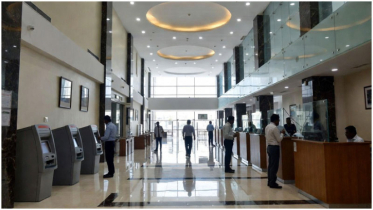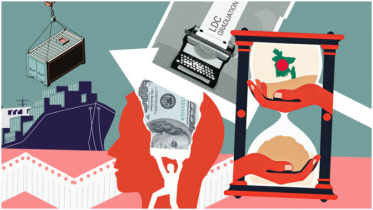From a basket case to a GovTech leader

The year 2022 was an extremely challenging year. The major damage from Covid-19 was no longer the lives it took but the consequences of the policies that countries hastily enacted.
Russia's invasion of Ukraine left the world in a very delicate balance, with rising inflation and energy crisis becoming the norm.
In the middle of these two major setbacks and all the challenges and shocks that each and every country was experiencing, Bangladesh was continuing to defy the odds and still making progress.
The GDP growth, while affected by the events above, continues to be steady. We will soon hit $3,000 in per capita income. We will graduate to a middle income country very soon.
But it is our progress in digitization, beyond the high level numbers, that is also being recognized by international organizations -- in an empirical, tangible manner. This leaves little room for doubt. The naysayers may say what they want but Digital Bangladesh is real, and there is undeniable proof of progress.
First, Bangladesh's progress in UNDESA's E-Government Survey, which was certainly impressive. Bangladesh ranked 111th, which was up from 148th from 2014. E-governance is the present and the future, and Bangladesh's steady progress is a sign that we remain on the right path.
Yet, the 111th rank did not feel right. It felt that Bangladesh had done much better than this ranking. While progress was undeniable, progress did not seem up to expectation.
And the World Bank's GovTech Maturity Index (GTMI) has given us a far clearer picture of just how much progress Bangladesh has made.
Understanding “GovTech”
As defined by the World Bank itself, GovTech is “a whole-of-government approach to public sector modernization and promotes simple, efficient, and transparent government with the citizen at the center of reforms.”
From the definition itself, we can pick up on the key themes here which are whole-of-government and citizen-centric reforms within the digital transformation that is to occur.
The Bangladesh government has promoted digital transformation keeping in mind the people of Bangladesh for the past 15 years. In fact, this is the very core of Digital Bangladesh and the a2i program -- a bottom-up, citizen-centric approach to simplifying public service delivery to reach each and every citizen, harnessing the power of digitization to make this possible.
Bangladesh and the GTMI of 2022
The World Bank calls the Govtech Maturity Index “ the most comprehensive measure of digital transformation in the public sector.”
And why would it not be? Firstly, it has four components to it:
1. Core Government Systems, which looks at demand for modernization and integration of core government systems. Key is the importance placed on the development of an overarching digital government transformation strategy and a set of principles to foster effective use of digital platforms and data that are interoperable and secure, as a part of the whole-of-government approach discussed earlier.
2. Public Service Delivery, which emphasizes design of human-centred online services that are simple, transparent, and universally accessible. Special attention is paid to services that are accessible by low-cost digital solutions, such as mobile phones and free open source applications, tailored to digital literacy and reaching all intended beneficiaries and users.
3. Citizen Engagement, which emphasizes developing and deploying tools including citizen feedback and complaint-handling mechanisms, using simple technology.
4. GovTech Enablers, which strengthens GovTech enablers and includes work on how to build digital skills in the public sector and an environment that fosters innovation in the public sector.
With such a comprehensive set of parameters and holistic perspective to public sector digitization, it is fair to say, therefore, that any country's performance on this index -- which gains significant legitimacy due to it being developed by the World Bank -- offers fool-proof evidence of the country's progress as far as digital transformation of the public sector is concerned.
It is here where Bangladesh has earned the right to be proud, for in the GTMI 2022, Bangladesh has entered the group of countries displaying “very high GovTech Maturity.” In other words, this is category A -- the category of the leaders.
Read that again. Bangladesh is a GovTech Leader.
Although the World Bank does not publish direct ranking, but estimating based on the score, Bangladesh placed 29th among the 198 countries that are part of the index.
This is where we are allowed to feel pride. Pride most significantly in being one of the top nations in the world on an index that is not population or corruption or susceptibility to climate change -- the things we are mostly associated with.
There is no surprise in Bangladesh's ranking here. After all, we at a2i have embodied the four components of the GTMI from our very inception.
When we come across terms such as “digital government transformation strategy,” we think of the government's plans to build a Digital Bangladesh 15 years ago and we also think of Smart Bangladesh that we wish to build in less than 20 years.
When we see that “special attention is paid to services that are accessible by low-cost digital solutions” we think of how we repurposed our TV channel during the height of the pandemic to deliver lessons to students when they were in lockdown.
When we are told that we need “an environment that fosters innovation in the public sector” we are reminded of Prime Minister Sheikh Hasina encouraging those in her government and civil service to take risks and embrace failure so that innovation is not stopped.
So we are happy but we are not satisfied. We may be a leader now in GovTech, but we must keep improving. Goals seem unrealistic but only when we dare to dream can we achieve them, much like the unrealistic dream that we will build a Smart Bangladesh in less than 20 years.
We have come a long way from being a “basket case.” We have continued to prove our naysayers wrong. And we will continue to do so.
Source: Dhaka Tribune
.png)




